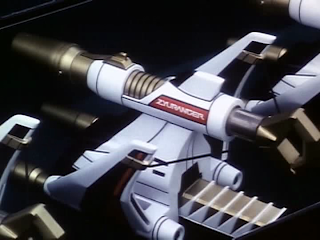One of the many reasons why I personally still don't like Power Rangers aside from the tendency to add people like Bulk and Skull (or lately the siblings in Beast Morphers) is the licensed use of fight footage from Toei. Sure, we've got Saban, Disney and now Hasbro paying for the use of fight footage but do you know how AWKWARD it gets? Here's going to be a bit of flashback to how awkward it gets...

If you've rewatched Mighty Morphin's first season -- you will realize that there's the poor attempt to edit out ZYURANGER from the Japanese equipment. It's because the U.S. exclusive morphers write "POWER RANGERS" instead. Hmmm, I wonder what excuse will Zordon have or what excuse did they have for this badly done edit?


Well it's already common knowledge by now with Power Rangers fans that you've got that She's A Man in Japan trope. I always still find it funny how Trini becomes a MAN every time Zyuranger stock footage gets used. Sure, one can always argue that we've got male suit actors playing female actors too such as Mika's death in Bioman failed to conceal the fact that Yellow 4 was always acted by a male stuntman. Then there's one thing worth noting...

Sure, a male stuntman plays it but at least they use some padding to make it look like a woman in spandex suit. But I guess this is what started the SKIRT tradition -- because male actors doubling as a stunt double for females is pretty much the norm. It still makes me feel weird or two to how it happens. But the skirts have done their charm. Boi is obviously meant to be male with the absence of him having a skirt. Hmmm, both Yellow 4 and Pink 5 in Bioman were also played by male stunt doubles that time too. But then the availability of female stunt actors started to go such as that Ptera Ranger was played by suit actress Rie Murakami though Motokuni Nakagawa (a man) did stunt doubling for a lot of pink rangers later on.
So it's still an adaptation (business-wise) according to Globalization and Language Association's definition of localization:
Localization (also referred to as "l10n") is the process of adapting a product or content to a specific locale or market. Translation is only one of several elements of the localization process. In addition to translation, the localization process may also include:
- Adapting graphics to target markets
- Modifying content to suit the tastes and consumption habits of other markets
- Adapting design and layout to properly display translated text
- Converting to local requirements (such as currencies and units of measure)
- Using proper local formats for dates, addresses, and phone numbers
- Addressing local regulations and legal requirements
Then again that, doesn't change the fact that Power Rangers' use of footage is a problem, right? Run out of Japanese footage and you're game over! That's how VR Troopers eventually died off - they simply ran out of footage to use!
This would also make me think of how and why I don't have a problem with Japanese media getting adapted by Taiwanese and South Korean entertainment companies. It's because they do all the filming themselves -- the only thing they do is to get the rights to produce their own version or the licenses from said company. Such is not the case with Power Rangers -- it tends to become legal but lazy whenever several fight footage gets used. Not to mention Power Rangers Megafail wins that award of really bad editing in this day and age! They could have filmed more original footage of the Gokai change BUT they ended up just doing so much bad editing that pre-Zyuranger powers were lazily added. WTF?! I guess there are more Power Rangers fans walking out thanks to Megafail, right?
It just really makes me wonder why they just end up relying more often than not on the Super Sentai fight footage even when they make their own footage as well? Hmmm... leaves room for more thought!
Comments
Post a Comment